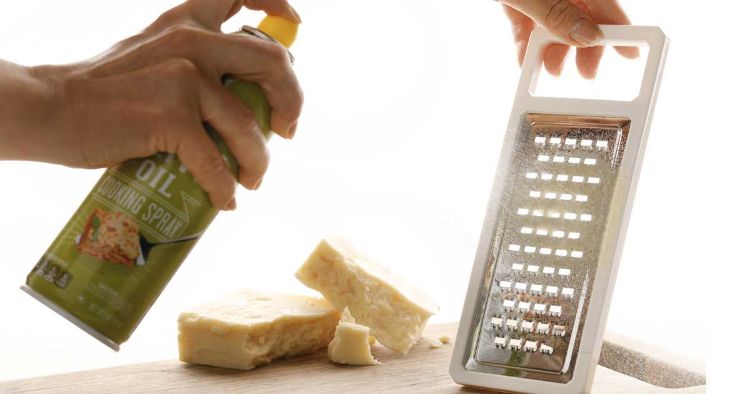Whether they cook a lot or just want to whip up a quick family meal, most cooks love a good shortcut and advice about how to do things more easily. It make take years before someone realizes she or he doesn't have to lean down hard on a cutting board to keep it from sliding across the counter top. Perhaps you've always wanted to grow herbs but thought you'd never be able to use them all before they wilted.
From preserving the longevity of herbs to hastening onion caramelizing, these cooking tips will help around the kitchen.
Advertisement
How to prolong herbs in the kitchen
Once picked, many fresh herbs quickly wilt, and when the leaves are harvested, it's a race against time to use them up. There are a variety of methods to prepare herbs so cooks can use them later.

Cooktop Cove
Dried herbs last a while, but instead of waiting for them to dry naturally, pop the leaves in the oven to speed up moisture removal. Get the full tutorial on herb preservation here.
Put a damp dish towel underneath cooking board to prevent it from moving around
Some cooking and cutting boards have small rubber pads on the bottom for traction – but most do not. When cutting something, it is essential the board not move and jostle the knife. When kneading dough, traction is important so the baker doesn't shoot the board forward and land on his or her face. A damp kitchen towel provides traction for the cooking board. Make sure it is not soaking wet, and place it between the board and the countertop.

Cooktop Cove
How to caramelize onions faster
Cut caramelizing time by more than half just by adding a "secret ingredient." This ingredient affects the Maillard reaction, which is when sugar and amino acids work to create flavors and start processes such as browning. Get the full tutorial here.

Cooktop Cove
Pre-soak pasta and it cooks in about 1 minute
The whole point of cooking pasta is to rehydrate it, so soaking it ahead of time adds moisture, which ultimately reduces cooking time. Treat the pasta as you would beans, soaking them for three to four hours. Pre-soaked pasta also works well when making baked dishes such as ziti, as the pasta won't get mushy. When cooking the pasta on the stove, use less water than if the pasta was dry.

Cooktop Cove
Keep lemons in the fridge (handy tip to season dishes)
Numerous recipes call for lemon juice, and sometimes it's just not practical to buy a large bottle if it's just going to be used occasionally. Keep three or four lemons in the fridge for those days when you need fresh lemon juice or want to add flavor to a usual recipe. Lemon juice perks up fish, asparagus and vinaigrette.

Cooktop Cove
Make vegetable stock with veggie scraps
In addition to being great for a compost pile, vegetable scraps can be turned into a flavorful vegetarian stock for soups. Any vegetables work, so find the combination that tastes right for you. Get the full tutorial here.

Cooktop Cove
For easier use, coat grater with nonstick spray before use

Cooktop Cove
Cheese with a higher moisture content tends to stick and create traction when grated. This prevents a smooth and quick motion down the grater. A quick spritz of cooking oil lubricates the grater, allowing for faster grating. Remember to keep a firm grip on the cheese and watch your fingers and knuckles.
Use a garbage bowl while cooking
Having a bowl handy for food scraps cuts down on the time a cook spends turning from the counter to the garbage can. If a compost pile is available, add the scraps to it. If you are planning to start a compost pile, put the scraps in a freezer-safe bag and freeze them until you are ready to use them.

Cooktop Cove
Regularly replace the kitchen sponge
Many people think that because they're using soap on the sponge to wash dishes and counters, the sponge is clean. However, unless it's antibacterial, soap itself does not kill germs. Sponges eventually become a bed of bacteria and old food. Regularly replace the sponge to keep bacteria spread to a minimum.

Cooktop Cove
Easy potato peeling
It's hard to get around potato eyes and into indentations. Like with tomatoes, it's much easier to remove the skins after the potatoes have been boiled. This tutorial demonstrates an easy way to create a starting point to pull off the skins. Get the full tutorial here.

Cooktop Cove
Get knives sharpened by a professional
Most home cooks and all professional chefs have a knife or three that are favorites. Keep blades sharp on all knives, especially the most-used ones. There are gadgets available that allow you to sharpen knives at home, but they are not nearly as effective as getting them sharpened by a professional. A pro takes balance and edge width into account when sharpening and uses the right tools.

Cooktop Cove
Steam food without a steam basket
Not everyone has a steam basket. A large manual flour sifter or a large strainer will hold veggies while they are being steamed. Just remember to put the pot lid on as far as possible. Veggies also may be steamed with just a pot and water. Fill the pot with approximately 1/2 inch of water, bring the water to a boil, add the veggies and place the pot lid on top.
Advertisement

Cooktop Cove

